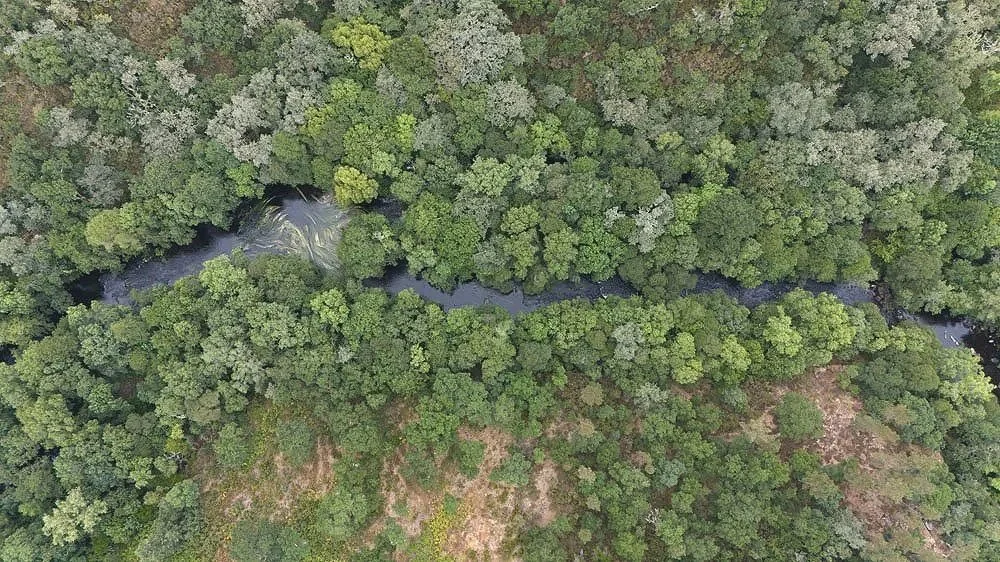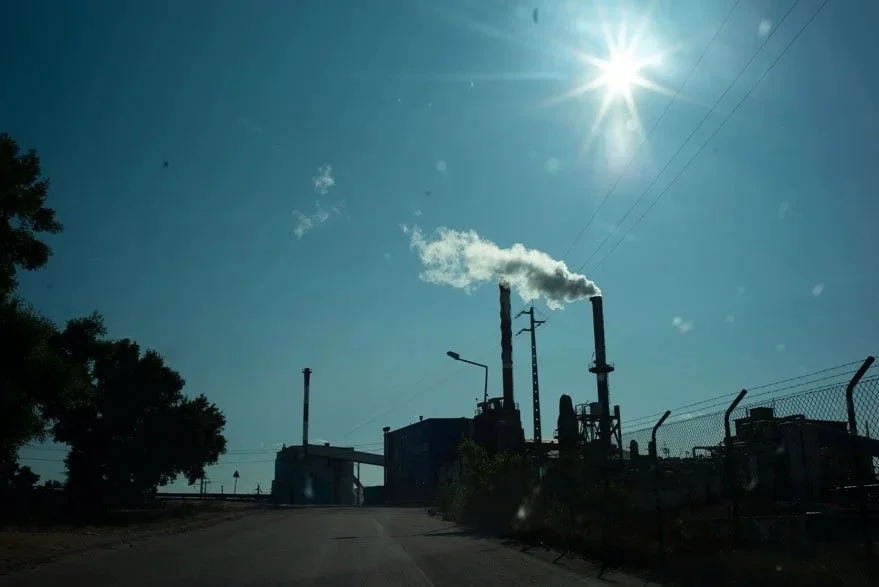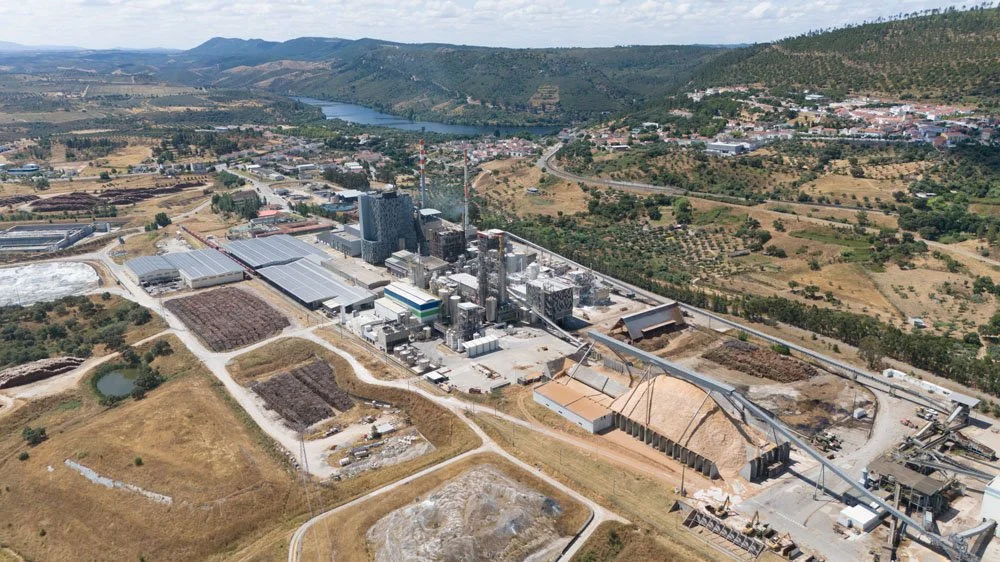ALTRI-GAMA: GREENWASHING AND ENVIRONMENTAL DESTRUCTION IN GALICIA
PALAS DE REI / FIGUEIRA DA FOZ, 2025-09-30. This cross-border investigation granted by Journalismfund Europe, reveals a Portuguese pulp company’s controversial plan for a pulp mill in Galicia. The project comes with multiple environmental risks and questions about the future of local industries.
A Portuguese company, Altri, intends to build a new pulp mill in Palas de Rei (Galicia, Spain). This project has sparked controversy in Galicia due to its potential impact on the environment and on the productive sectors that could be affected by these facilities, which have a significant weight in the Galician economy, especially the agricultural, fishing and tourism sectors.
Through extensive documentation, data analysis and fieldwork, contacting relevant sources in different areas and visiting the factories that Altri already has in operation in Portugal (in Constancia, Vila Velha de Ródão and Figueira da Foz), the journalists sought to gain a thorough understanding of the dimensions of this project and what it would mean for the region in which it would be implemented.
OUTFLOW PIPES TO THE RIVER WITH TOXINS AND DEATH. An aerial view of the Pozo das Pías (on the left side of the image) in Ulla River as it flows through the town of O Sexo, where you can see, on the left, the river's pollution caused by livestock companies. During the summer, children would swim in this area, or learn to swim. It was the joy of every summer, getting together with friends and cousins, and just being kids. Not anymore.
At that location, the Gama project has marked on its map the location of the outfall pipes containing water mixed with various toxic materials coming from the factory and at a temperature above 30°C.
The factory planned by Altri in Palas de Rei would emit 8 tons of pollutants per day and use up to 46 million liters of water from the Ulla River per day, according to project estimates, which has generated great concern and opposition from local residents and environmentalists.
Grant: Environmental Journalism by Journalismfund Europe
JOURNALISTS: Ana Loureiro, Yuri Carrazoni, Micael Pereira, Delmi Álvarez.
COUNTRIES: Spain, Portugal.
PUBLICATIONS: NÓS DIARIO (SERMOS GALIZA), MEDIOTEJO.NET (PORTUGAL), EXPRESSO.pt
The origins of this Environmental Journalism investigative project began in 2023, with the news in the Galician media that the installation of a mega-factory by Altri (a Portuguese company) in Palas de Rei was in the evaluation and debate phase, facing strong opposition from residents and environmentalists due to its potential environmental impacts and a large number of objections. The company continued its project to produce textile fibers from eucalyptus, while public opposition grew and the Xunta continued to analyze the proposal.
This project has been published and printed in newspaper by Nós Diario (Galicia) on September 27, 2025, and divided online in 5 chapters/articles available:
ONLINE
Un proxecto cheo de incertezas, Nós Diario, 26/09/2025 (Galician)
Como construír unha celulosa: o manual infalíbel? Nós Diario, 26/09/2025 (Galician)
Os nomes detrás de Altri, Nós Diario, 26/09/2025 (Galician)
O que conta o Texo, a pegada da celulosa en Portugal, Nós Diario, 26/09/2025 (Galician)
Cando a auga deixe de correr, Nós Diario, 26/09/2025 (Galician)
Altri en terra e mar, unha ameaza compartida? Nós Diario, 26/09/2025 (Galician)
Factory of Celbi in Figueira da Foz, Portugal. 2025. In the fishing town of Leirosa, a short distance from the pulp factory, there are those who look favorably on the factory and others who do not, the discussions are divided, but the company employs many families, the children of former workers. As for the smell, which can reach up to 30 kms. from a distance, people say that with the wind that comes from the Atlantic Ocean and normally blows in a West-East direction, it does not affect them, since the emissions from the chimney go inwards and the sense of smell has become accustomed over the years.
Worse is the case of the Bioadvance factory, for the production of biodiesel, also in Figueira da Foz, which according to SIC Noticias/Investigation in February and March 2025, assured that this "unlicensed factory received almost 4 million euros in EU funds. The (Portuguese) State supported a factory for transforming cooking oil into biodiesel with almost four million euros of EU funds, and this factory was built without a license. In this Wednesday's SIC Investigation, we look at a case that threatens to become an embarrassment. The fact is, when the public consultation for the project opened, the factory was already built and apparently operating... without authorization".
João Oliveira (The Left), MEP in Brussels, sent questions for written answer E-000982/2025 to the Commission, "according to local residents, BioAdvance omitted relevant information during the licensing procedure, in particular with regard to the use of hazardous substances, especially methanol and hazardous waste.
Locals are complaining about toxic gases in the city of Figueira da Foz, particularly in the parish of Vila Verde, where the plant is located. It has been reported that the project has been supported with EU funding.
Oliveira asked to the EC:
1. Can the Commission confirm that the establishment and operation of this plant was supported with EU funding?
2. What exact sums did the company receive, and for what purposes?
Caima factory (ALTRI) in Constância, Portugal. 2025. Information about the Caima factory, located across the Tagus River from the city of Constância and inaugurated in 1960, is scarce, likely deliberately suppressed or removed from search engines.
The factory primarily employs workers from Constância, which lies on the other side of the Tagus River. Its history, or the one recounted by its residents and environmental activists, is also riddled with scandal, even more so than that of Biotek. On October 3, 2014, two men were burned to death in an accident at the Caima pulp mill while performing chimney maintenance. The two workers, aged 26 and 28, were from Bairrada and were employed by Orbisource, one of the companies contracted by Caima to carry out maintenance work.
In September 2013, a large spill of nitric acid at the Caima pulp mill in Constância caused panic among the population living near the factory. The spill created a large toxic cloud that frightened people, and according to physical chemistry professor Nuno Alfaiate, who lives in the area, this is yet another episode of pollution problems that he has been warning about. In June 2022, the untreated sewage that was being discharged into the middle of the Tagus River in front of the town of Constância in mid-June was of an industrial nature, and its chemical composition was consistent with the pulp and paper industry, according to laboratory analyses that two citizens of Constância commissioned after collecting samples.
According to the chemical analysis report, "the fact that the sample has a strong smell of sulfur, the color it presents, as well as the concentrations of sulfate and sulfite, indicates that this sample comes from a wastewater discharge whose process uses sulfur compounds, such as those used in the cooking of wood by pulp and paper companies." And there is only one pulp and paper industry there: the Caima factory.
In July 2025, Altri announced it would invest 90 million euros in a new factory in Constanta to produce the first biodegradable lyocell filament designed to replace polyester and nylon. Altri buys Swiss company that produces yarns for the textile sector already used in limited collections by Hugo Boss and Lameirinho
It's a variant in its business. Altri has acquired Aeoniq, which produces textile yarn. The value of the transaction was not disclosed. The purchase will involve the construction of a factory in Constância.
BIOTEK, Vila Velha de Ródão, Portugal. 2025. In 2017, the company Celtejo (part of the Altri group) was involved in several pollution incidents in the Tagus River, which included illegal discharges and caused great public and environmental concern. In a clear and well-thought-out action to erase Altri's name from internet search engines, the company decided to change the name of the former CELTEJO to Biotek. This way, if you search for "chemical spills or pollution from Biotek into the Tagus River," no information is found. However, if you use CELTEJO, the information is abundant. Confirmation of illegal discharges: The Portuguese environmental group Zero announced that the Ministry of the Environment had confirmed illegal discharges by Celtejo in 2015, 2016, and 2017.
Inspections and controversy: In early 2017, environmental authorities inspected pulp mills (including Celtejo) and initially concluded that they were complying with their respective authorized discharge volumes, although this conclusion was challenged by environmentalists.
Serious pollution incidents: In October 2017, a serious incident occurred in which thousands of fish died in the Tagus River. This reignited suspicions of industrial pollution, beyond natural causes.
Portuguese Environment Agency (APA): Subsequently, the APA admitted that the pulp mills (with Celtejo being the main emitter, responsible for 90% of the discharges in that area) were responsible for the pollution that generated layers of foam in the river in early 2018, but that this originated from the accumulation of organic material from the previous year. Analyses showed cellulose levels 5,000 times higher than recommended.
Restrictions and measures: As a consequence of these events and public pressure, the Portuguese government imposed restrictions on Celtejo's operations in early 2018, which were extended due to the high levels of pollution recorded.
Petitions to the European Parliament: The serious and persistent pollution of the Tagus River, coupled with insufficient action by the Portuguese government, was the subject of petitions to the European Parliament in 2017.
In short, 2017 was a year of intense pollution problems attributed to Celtejo, leading to the confirmation of past illegal discharges and an environmental crisis that resulted in government measures and a major public debate in early 2018.
Portuguese environmental activist Arlindo Marques (a member of the proTEJO environmental movement) publicly denounced the Celtejo company on numerous occasions for polluting the Tagus River. However, the situation took an unusual turn: it was Celtejo that sued Arlindo Marques, not the other way around, in an attempt to silence his denunciations.
ALTRI-GAMA, Palas de Rei, Galiza. 2025. Aerial view of the land belonging to the Quintas estate, subleased to ALTRI for the construction of its mega-factory in Palas de Rei, Galicia. The Quintas lagoon, a protected area, borders the land.
Key aspects of the project in 2023
Company Positioning:
Throughout 2023, Altri defended its "GAMA" project, highlighting the economic benefits and job creation, which would create approximately 500 direct jobs, according to the company.
Public Opposition:
The project generated strong opposition due to its potential impacts, such as pollution of the Ulla River and the Arousa estuary, massive water consumption (46 million liters per day), and the emission of toxic substances.Evaluación de la Xunta: The Xunta de Galicia was evaluating the project, receiving thousands of objections and requesting justifications from Altri to minimize the negative impacts.
UPDATES ON THE ALTRI-GAMA PROJECT
October 2025:
In 2025, Altri recorded losses of €8 million on the Palas de Rei project, with a cumulative investment of more than €17 million. Furthermore, the company faces massive social backlash, strong opposition from environmental organizations, and has suffered a €240 million stock market crash in 2025, jeopardizing the project's viability.
Power connection denied: The central government rejected Altri's request for an electrical substation, which is necessary for the plant and to access 220 kilovolts of power.
Altri's Reaction: The company considers the decision to be "political" in nature and has stated that it will appeal. Altri's Warning: Altri has warned that the lack of access to the electricity grid in the coming years will doom the project's future.
Greenalia attempts to disassociate itself from Altri pulp mill after the denial of electricity connection.
Manuel García Pardo's company is threatening legal action against those who link the pulp mill to his group, despite the fact that he himself owns 25% of the parent company, Greenfiber, through his holding company, Smarttia.
Altri increases its bill in Galicia with the plant in technical shutdown: it paid 16 million for Greenalia's forestry business. In addition to the nearly 18 million it has invested over the last three years in Greenfiber, the company promoting the Palas de Rei project, the Portuguese group closed the acquisition of Greenalia Forest and Greenalia Logistics in May.
Accumulating losses. Altri increases its investment in Galicia with the plant in technical crisis: it paid 16 million for Greenalia's forestry business.
In addition to the nearly 18 million it has invested in Greenfiber, the company promoting the Palas de Rei project, over the last three years, the Portuguese group finalized the acquisition of Greenalia Forest and Greenalia Logistic in May. According to the latest report published by Greenfiber in the Mercantile Registry, Altri and Smarttia injected a total of 23.6 million euros into the company in recent years.
The Ulloa Viva platform (against the Altri-Gama installation) entrusts USC technicians with "critical" reports with the Xunta's environmental impact declaration to Altri. The Ulloa Viva Platform has commissioned technicians from the University of Santiago de Compostela (USC) to prepare "critical" reports with an environmental impact declaration authorized by the Xunta a Altri.
Financial losses:
Altri has reported €8 million in losses for the Palas de Rei project through July 2025, despite having invested more than €17 million.
Stock market crash:
The company's stock market value plummeted by €240 million in three months due to project uncertainty and unfavorable trends in wood pulp prices.
Social Outcry:
There have been massive demonstrations in Galicia, with up to 100,000 participants, and more than 20,000 complaints filed against the project, reflecting strong social opposition.
Environmental Opposition:
More than 50 organizations, including Greenpeace, WWF, and Friends of the Earth, have called for the project to be permanently halted, arguing that it has a negative impact on biodiversity, water resources, and protected areas.
Environmental risks:
Opposition focuses on potential damage to aquatic ecosystems such as the Portodemouros reservoir and the Ulla River, the risk to endangered species, and the impact on protected areas such as the Natura 2000 Network.
Investment uncertainty:
Some reports suggest that the project partners could lose approximately €26.7 million if the macrocellulose project fails to materialize.
The Figures
This mega-cellulose mill will extract 46 million liters of water per day from the Ulla River. As much as the entire province of Lugo consumes. It will dump 30 million liters of contaminated wastewater back into the Ulla River every day. Not only will it misuse water, so necessary in times of drought, but it will also pollute what remains.
The chimney they will install next to the Camino de Santiago will be 75 meters high, releasing sulfur, sulfur oxides, nitrogen oxides, carbon monoxide, and particulate matter into the atmosphere.
They will eventually need 2.4 million tons of eucalyptus. This sharp increase in demand will force even more Galician land to be filled with this eucalyptus monoculture, which is doing so much damage to the biodiversity of the northern Iberian Peninsula and increasing the danger and virulence of fires in Galicia, as we see every year.
€250 million in public money has been requested for its implementation. 250 million from Next Generation funds that will be used to bring a natural environment to a standstill. The Spanish Government has denied or disapproved the provision of this money. Although the project violates the spirit of the Next Generation, the European Commission welcomes the project.
GALLERY SELECTION
Below, is a selection of images of the project, field work in 2025.














































































































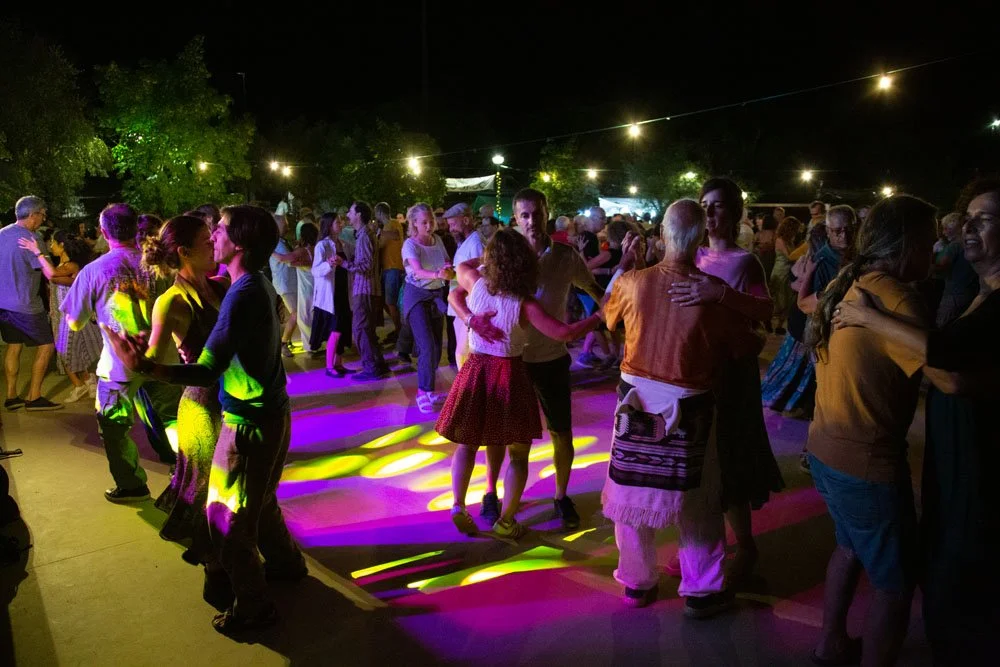



























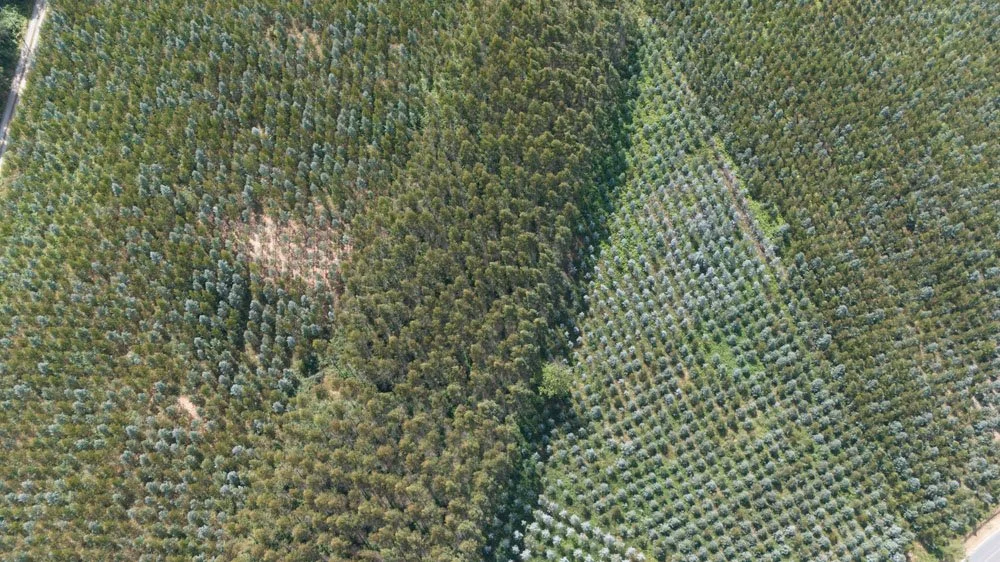
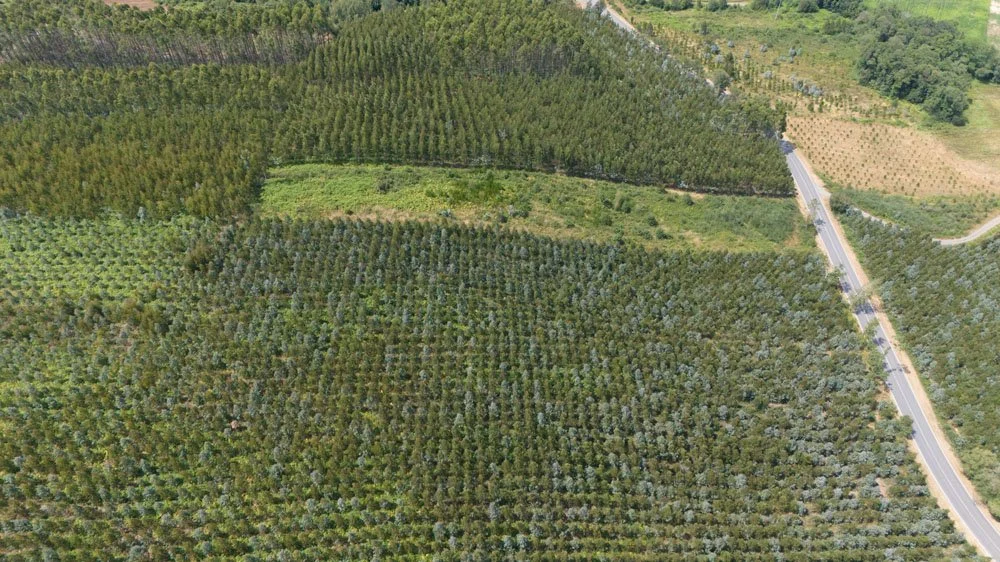



















This investigation was developed with the support of Journalismfund Europe.
If you are a media outlet, magazine, news organization, environmental blogger,
NGO, etc, we provide a PRESS KIT for free with texts available in english,
galician and spanish languages.
For more info, please use the contact form in this website.
Disclaimer: This is a statement that clarifies the content's origin, intent,
or limitations, such as noting that opinions are the author's own
and not the organization's, or that a piece is sponsored.
The views expressed in this story/investigation are those of the authors
and do not necessarily reflect the views of Journalismfund Europe.
